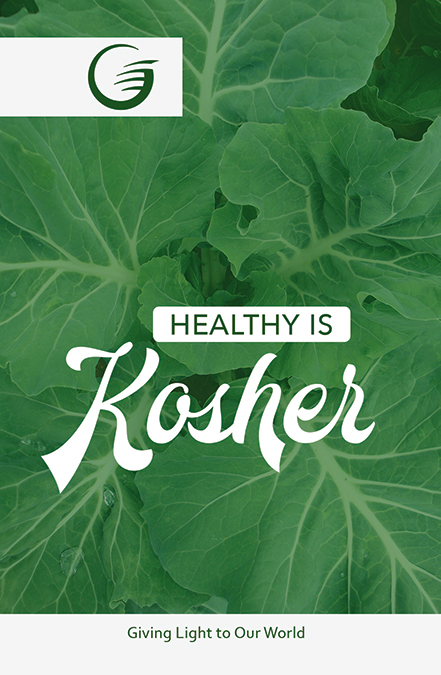
Healthy is Kosher!
$6.99
Healthy is Kosher!
Health is more than ever one of the hot topics today! One can barely walk down a street, mosey through a shop, or browse the Internet without facing a significant number of health-targeted ads and gimmicks. Health fads seem to be popular today, but really, the concern for health is as old as sickness itself.
Written records tell us about ancient concerns for diet and sanitation in various cultures. In the Hebrew Bible, we can find a great emphasis on dietary classifications, restrictions, and hygiene. This biblical emphasis is closely linked to religious instruction and ritual and is not spelled out as health instructions per se, but as we look at them from today’s perspective, we can hardly miss the benefits of such mandates—instructions that still make us “kosher.”
In Devarim/Deuteronomy we find an oft-claimed promise for those who keep the Torah in regard to healthful living: “And the LORD will take away from thee all sickness; and He will put none of the evil diseases of Egypt, which thou knowest, upon thee, but will lay them upon all them that hate thee” (7:15).
The promise of a blessing is not just some unseen power that comes to people if they keep the Torah. HaShem doesn’t just stand over us with a magic wand. This blessing is the fruit of a healthful, spiritually enriching, moral relationship—personally knowing and experiencing the will of the G-d of Abraham, Isaac, and Jacob. To understand better some of HaShem’s more practical instructions for blessing, we need to dig a little deeper.
Kosher in the Hebrew Bible
The Hebrew Bible gives us the separation between the clean and the unclean. To understand what being healthful in the Torah means when defining kaf-shin-resh כשר (Kasher), the terms clean and unclean guide us to understand what G-d was communicating to our ancient ancestors, people of the Covenant. The words clean and unclean are standards found in the Torah that we logically associate with different meats regarded in the Torah as acceptable and unacceptable for eating based on Vayikra/Leviticus 11. The implications of their definitions extend beyond food and illuminate how human activities render a person physically or spiritually contaminated, defiled, or absorbed in some sort of immoral or destructive behavior. Being kosher involves a person’s behavior, attitudes, and actions. The assumption is that as people are separating things in their diet according to the Torah, they are becoming trained and disciplined to likewise learn how to live a disciplined and healthful lifestyle. This foundation of being kosher builds a disciplined, balanced, and self-aware lifestyle.
The basic root for conveying the idea of cleanness is taheir, טָהֵֽר (Vayikra/Leviticus 15:13; 22:4), and this word in Torah conveys the cleansing of a person in three main ways: one, physically (Ezekiel 39:12; Job 37:21; 2 Chronicles 29:15,16,18); two, ceremonially (Vayikra/Leviticus 16:19; Nehemiah 12:30; Ezekiel 43:26); and three, morally (Vayikra/Leviticus 16:30; Psalm 51:2). This implies that this word describes people who are in tune with G-d on all levels of their lives—spiritual, physical, psychological, and emotional.
Closer examination of the Torah reveals a deeper lesson in the relationship between health and the biblical description of kosher. When looking at the Torah and the root words involved in creating a word, we must remember that Hebrew words are adaptations based on a group of consonants that make up the root of the word. For example, the Hebrew root, kaf-shin-resh, כשר, is the foundation for the words kosher (and kashrut). This root literally means fit, proper, or worthy. Like all Hebrew word studies, this invites further contemplation in consideration of all things kosher to be all things fit, proper, and worthy.
Today, we think of kosher as a term indicating that food or other items are fit for Jewish consumption or purpose. We look for the kosher symbol on our food at the market and butcher. We also make sure our religious items such as tzitzit, tallitot, tefilin, and mezuzot are all kosher as well, further legitimizing our mitzvoth. But the tradition of ‘kosher’ goes much deeper than this when we delve into historical roots.
Let’s look for the word kosher in the Torah. Surprisingly, it doesn’t appear in the context of food at all, as one might expect. In fact, the word kosher doesn’t even appear in the Torah at all—not once in all of the books of Moses! In actuality, a word using the kaf-shin-resh (כשר) root appears just three times in later biblical texts; however, this is not in reference to the food a person eats. We find it in the book of Kohelet/Ecclesiastes, where the word root means succeed. We also find it in the Book of Esther where it means appropriate. The book of Esther has the closest meaning to current definitions of kosher in its description of King Ahasuerus’ assessment of Esther, that she is kosher, or appropriate, which is part of the reason why he ultimately chooses her to be his queen. Thus, appropriate is another word to add to this growing classification of all things kosher. This word should be included with fit, proper, worthy—and surely what we would also deem healthful.
Health and Wellness
For people to be healthy, their spiritual, psychological, emotional, and physical aspects must be balanced and sound. We recognize today that diet, exercise, and purposeful relaxation are powerful tools in attaining and maintaining wellness. When all these aspects of a person’s self are in good maintenance, levels of resilience, clarity of mind, and physical energy are the highest. When a person is kosher, a standard of regulations promotes living healthfully. Today, studies show that pork and shellfish can bring health concerns. By not eating those, we are already ahead, but being kosher is more than just following rules of kashrut; it encompasses the entire existence of the observant Jewish person. For instance, a day of rest once a week is rejuvenating. Forgiveness and doing teshuvah are extremely healthful, not only for spirituality, but also for emotional health with psychological and even physical benefits! Being kosher is indeed the keeping of an appropriate lifestyle—one that is disciplined, balanced, and self-aware.
While the Jewish community holds the golden truths of Torah closely, they are not alone in their beliefs about many of the kosher laws. Other groups of people, including the Seventh-day Adventists, also recognize the validity of the Jewish Torah and the separation between the clean and unclean foods. They find these laws to be an important part of a healthful lifestyle, along with other healthful Jewish lifestyle traditions such as a weekly Shabbat and teshuvah. Scientific studies involving Seventh-day Adventists have proven that living a lifestyle with a weekly Sabbath rest and observing a diet without treif1 has contributed to an increased lifespan.2 So, while keeping kosher in a Jewish context of holiness, we can all rest assured that we are also adding health to our lives as we embrace the Torah in its many facets of healthful living.
Have you been allowing some aspects of real kosher living slip? For ideas and help in living a truly healthy, happy, and holy life, visit healthlibrary.lomalindahealth.org. You can also contact us at JewishAdventist.org.
Great is Torah, for it gives life to those who do it in this world and in the next world, as it says: “For they are life to those that find them, and healing to all his flesh” (Proverbs 4:22); and it says, “It will be healing for your navel, and tonic to your bones” (Proverbs 3:8).—Pirkei Avot 6:7
1Yiddish word for any form of non-kosher food.
2Studies also included moderate exercise with a predominantly vegetarian diet.
References taken from the Jewish Publication Society (JPS) Bible, 1917.
21 in stock
Healthy is Kosher!
Health is more than ever one of the hot topics today! One can barely walk down a street, mosey through a shop, or browse the Internet without facing a significant number of health-targeted ads and gimmicks. Health fads seem to be popular today, but really, the concern for health is as old as sickness itself.
Written records tell us about ancient concerns for diet and sanitation in various cultures. In the Hebrew Bible, we can find a great emphasis on dietary classifications, restrictions, and hygiene. This biblical emphasis is closely linked to religious instruction and ritual and is not spelled out as health instructions per se, but as we look at them from today’s perspective, we can hardly miss the benefits of such mandates—instructions that still make us “kosher.”
In Devarim/Deuteronomy we find an oft-claimed promise for those who keep the Torah in regard to healthful living: “And the LORD will take away from thee all sickness; and He will put none of the evil diseases of Egypt, which thou knowest, upon thee, but will lay them upon all them that hate thee” (7:15).
The promise of a blessing is not just some unseen power that comes to people if they keep the Torah. HaShem doesn’t just stand over us with a magic wand. This blessing is the fruit of a healthful, spiritually enriching, moral relationship—personally knowing and experiencing the will of the G-d of Abraham, Isaac, and Jacob. To understand better some of HaShem’s more practical instructions for blessing, we need to dig a little deeper.
Kosher in the Hebrew Bible
The Hebrew Bible gives us the separation between the clean and the unclean. To understand what being healthful in the Torah means when defining kaf-shin-resh כשר (Kasher), the terms clean and unclean guide us to understand what G-d was communicating to our ancient ancestors, people of the Covenant. The words clean and unclean are standards found in the Torah that we logically associate with different meats regarded in the Torah as acceptable and unacceptable for eating based on Vayikra/Leviticus 11. The implications of their definitions extend beyond food and illuminate how human activities render a person physically or spiritually contaminated, defiled, or absorbed in some sort of immoral or destructive behavior. Being kosher involves a person’s behavior, attitudes, and actions. The assumption is that as people are separating things in their diet according to the Torah, they are becoming trained and disciplined to likewise learn how to live a disciplined and healthful lifestyle. This foundation of being kosher builds a disciplined, balanced, and self-aware lifestyle.
The basic root for conveying the idea of cleanness is taheir, טָהֵֽר (Vayikra/Leviticus 15:13; 22:4), and this word in Torah conveys the cleansing of a person in three main ways: one, physically (Ezekiel 39:12; Job 37:21; 2 Chronicles 29:15,16,18); two, ceremonially (Vayikra/Leviticus 16:19; Nehemiah 12:30; Ezekiel 43:26); and three, morally (Vayikra/Leviticus 16:30; Psalm 51:2). This implies that this word describes people who are in tune with G-d on all levels of their lives—spiritual, physical, psychological, and emotional.
Closer examination of the Torah reveals a deeper lesson in the relationship between health and the biblical description of kosher. When looking at the Torah and the root words involved in creating a word, we must remember that Hebrew words are adaptations based on a group of consonants that make up the root of the word. For example, the Hebrew root, kaf-shin-resh, כשר, is the foundation for the words kosher (and kashrut). This root literally means fit, proper, or worthy. Like all Hebrew word studies, this invites further contemplation in consideration of all things kosher to be all things fit, proper, and worthy.
Today, we think of kosher as a term indicating that food or other items are fit for Jewish consumption or purpose. We look for the kosher symbol on our food at the market and butcher. We also make sure our religious items such as tzitzit, tallitot, tefilin, and mezuzot are all kosher as well, further legitimizing our mitzvoth. But the tradition of ‘kosher’ goes much deeper than this when we delve into historical roots.
Let’s look for the word kosher in the Torah. Surprisingly, it doesn’t appear in the context of food at all, as one might expect. In fact, the word kosher doesn’t even appear in the Torah at all—not once in all of the books of Moses! In actuality, a word using the kaf-shin-resh (כשר) root appears just three times in later biblical texts; however, this is not in reference to the food a person eats. We find it in the book of Kohelet/Ecclesiastes, where the word root means succeed. We also find it in the Book of Esther where it means appropriate. The book of Esther has the closest meaning to current definitions of kosher in its description of King Ahasuerus’ assessment of Esther, that she is kosher, or appropriate, which is part of the reason why he ultimately chooses her to be his queen. Thus, appropriate is another word to add to this growing classification of all things kosher. This word should be included with fit, proper, worthy—and surely what we would also deem healthful.
Health and Wellness
For people to be healthy, their spiritual, psychological, emotional, and physical aspects must be balanced and sound. We recognize today that diet, exercise, and purposeful relaxation are powerful tools in attaining and maintaining wellness. When all these aspects of a person’s self are in good maintenance, levels of resilience, clarity of mind, and physical energy are the highest. When a person is kosher, a standard of regulations promotes living healthfully. Today, studies show that pork and shellfish can bring health concerns. By not eating those, we are already ahead, but being kosher is more than just following rules of kashrut; it encompasses the entire existence of the observant Jewish person. For instance, a day of rest once a week is rejuvenating. Forgiveness and doing teshuvah are extremely healthful, not only for spirituality, but also for emotional health with psychological and even physical benefits! Being kosher is indeed the keeping of an appropriate lifestyle—one that is disciplined, balanced, and self-aware.
While the Jewish community holds the golden truths of Torah closely, they are not alone in their beliefs about many of the kosher laws. Other groups of people, including the Seventh-day Adventists, also recognize the validity of the Jewish Torah and the separation between the clean and unclean foods. They find these laws to be an important part of a healthful lifestyle, along with other healthful Jewish lifestyle traditions such as a weekly Shabbat and teshuvah. Scientific studies involving Seventh-day Adventists have proven that living a lifestyle with a weekly Sabbath rest and observing a diet without treif1 has contributed to an increased lifespan.2 So, while keeping kosher in a Jewish context of holiness, we can all rest assured that we are also adding health to our lives as we embrace the Torah in its many facets of healthful living.
Have you been allowing some aspects of real kosher living slip? For ideas and help in living a truly healthy, happy, and holy life, visit healthlibrary.lomalindahealth.org. You can also contact us at JewishAdventist.org.
Great is Torah, for it gives life to those who do it in this world and in the next world, as it says: “For they are life to those that find them, and healing to all his flesh” (Proverbs 4:22); and it says, “It will be healing for your navel, and tonic to your bones” (Proverbs 3:8).—Pirkei Avot 6:7
1Yiddish word for any form of non-kosher food.
2Studies also included moderate exercise with a predominantly vegetarian diet.
References taken from the Jewish Publication Society (JPS) Bible, 1917.
Each package contains 100 tracts.
Dimensions: 4.25 x 2.75 x 1.5 inches

